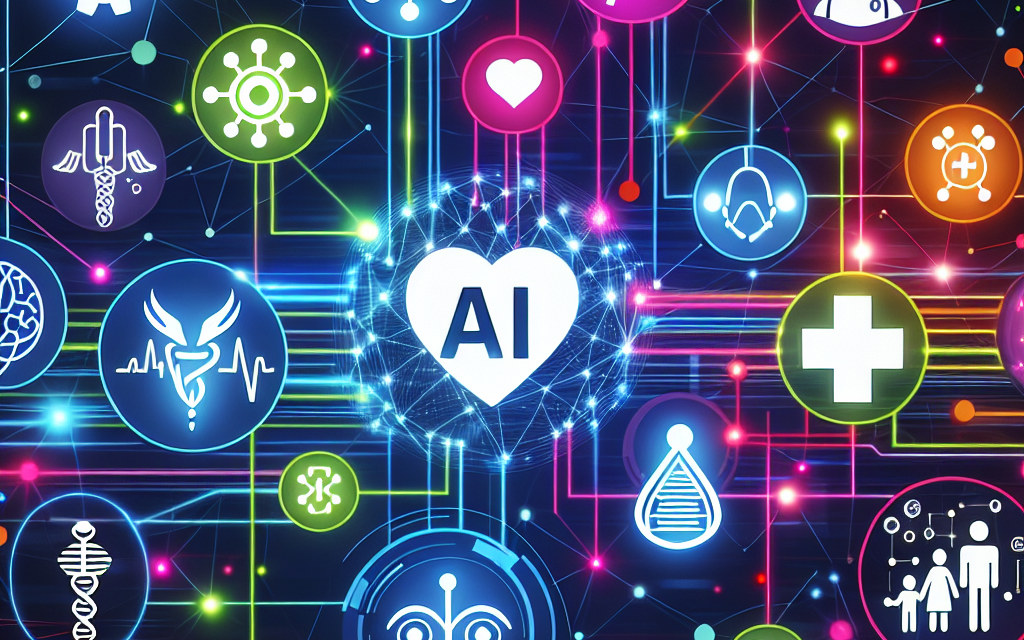HHS Unveils AI Strategic Plan: Key Insights for Healthcare and Human Services
The U.S. Department of Health and Human Services (HHS) has recently unveiled its AI Strategic Plan, a comprehensive framework aimed at integrating artificial intelligence into healthcare and human services. This initiative is poised to revolutionize the way healthcare is delivered, improve patient outcomes, and streamline administrative processes. In this article, we will explore the key insights from the HHS AI Strategic Plan, examining its implications for healthcare providers, patients, and policymakers.
1. Understanding the HHS AI Strategic Plan
The HHS AI Strategic Plan outlines a vision for the responsible and effective use of artificial intelligence in health and human services. The plan emphasizes the importance of ethical considerations, data privacy, and the need for collaboration among various stakeholders. The strategic plan is built on several core principles:
- Equity: Ensuring that AI technologies are accessible and beneficial to all populations, particularly underserved communities.
- Transparency: Promoting clear communication about how AI systems work and the data they use.
- Accountability: Establishing mechanisms to hold organizations responsible for the outcomes of AI applications.
- Collaboration: Encouraging partnerships between government agencies, private sector companies, and academic institutions.
- Innovation: Fostering an environment that supports research and development in AI technologies.
The strategic plan is a response to the rapid advancements in AI technology and its potential to transform healthcare delivery. By leveraging AI, HHS aims to enhance decision-making, improve patient care, and optimize resource allocation.
2. Enhancing Patient Care Through AI
One of the most significant implications of the HHS AI Strategic Plan is its potential to enhance patient care. AI technologies can assist healthcare providers in diagnosing diseases, personalizing treatment plans, and predicting patient outcomes. Here are some key areas where AI can make a difference:
2.1 Diagnostic Accuracy
AI algorithms can analyze medical images, lab results, and patient histories to identify patterns that may be missed by human clinicians. For instance, studies have shown that AI systems can outperform radiologists in detecting certain types of cancers in imaging studies. A notable example is the use of deep learning algorithms in mammography, which has demonstrated a reduction in false positives and improved detection rates.
2.2 Personalized Medicine
AI can analyze vast amounts of data from various sources, including genetic information, to tailor treatment plans to individual patients. This approach, known as precision medicine, allows healthcare providers to select therapies that are more likely to be effective based on a patient’s unique genetic makeup. For example, AI-driven platforms can help oncologists identify the most effective chemotherapy regimens for cancer patients based on their genetic profiles.
2.3 Predictive Analytics
AI can also be used to predict patient outcomes and identify those at risk of developing complications. By analyzing historical data, AI models can forecast which patients are likely to be readmitted to the hospital or develop chronic conditions. This information enables healthcare providers to intervene early, potentially preventing adverse outcomes and reducing healthcare costs.
2.4 Virtual Health Assistants
AI-powered virtual health assistants can provide patients with immediate access to information and support. These tools can answer questions about symptoms, medication adherence, and appointment scheduling, improving patient engagement and satisfaction. For example, chatbots can guide patients through pre-visit questionnaires, ensuring that healthcare providers have the necessary information before the appointment.
2.5 Telehealth Integration
The COVID-19 pandemic accelerated the adoption of telehealth services, and AI can enhance these platforms by providing real-time data analysis and decision support. AI can help triage patients during virtual visits, ensuring that those who need immediate attention are prioritized. Additionally, AI can analyze patient feedback from telehealth sessions to improve service delivery continuously.
3. Streamlining Administrative Processes
In addition to improving patient care, the HHS AI Strategic Plan aims to streamline administrative processes within healthcare organizations. Administrative burdens often detract from the time healthcare providers can spend with patients. AI can help alleviate these challenges in several ways:
3.1 Automating Routine Tasks
AI technologies can automate repetitive administrative tasks, such as scheduling appointments, processing insurance claims, and managing patient records. For instance, natural language processing (NLP) can be used to transcribe and organize clinical notes, reducing the time clinicians spend on documentation. This automation allows healthcare providers to focus more on patient care rather than paperwork.
3.2 Enhancing Revenue Cycle Management
AI can optimize revenue cycle management by predicting claim denials and identifying billing errors before they occur. By analyzing historical claims data, AI algorithms can flag potential issues, allowing healthcare organizations to address them proactively. This capability can lead to improved cash flow and reduced administrative costs.
3.3 Improving Supply Chain Management
AI can enhance supply chain management in healthcare by predicting demand for medical supplies and optimizing inventory levels. By analyzing usage patterns and external factors, such as seasonal illness trends, AI can help organizations maintain adequate stock levels while minimizing waste. This efficiency is particularly crucial in times of crisis, such as during a pandemic.
3.4 Streamlining Compliance and Reporting
Healthcare organizations must comply with numerous regulations and reporting requirements. AI can assist in monitoring compliance by analyzing data and identifying potential violations. Additionally, AI can automate the generation of reports, ensuring that organizations meet deadlines and maintain transparency with regulatory bodies.
3.5 Enhancing Workforce Management
AI can also improve workforce management by analyzing staffing patterns and predicting future needs based on patient volume and acuity. By optimizing staff schedules, healthcare organizations can ensure that they have the right number of providers available to meet patient demand, ultimately improving care delivery.
4. Addressing Ethical and Privacy Concerns
As AI technologies become more integrated into healthcare, ethical and privacy concerns must be addressed. The HHS AI Strategic Plan emphasizes the importance of responsible AI use, focusing on the following key areas:
4.1 Data Privacy and Security
Healthcare organizations must prioritize data privacy and security when implementing AI solutions. Patient data is highly sensitive, and breaches can have severe consequences. The HHS AI Strategic Plan advocates for robust data protection measures, including encryption, access controls, and regular audits to ensure compliance with regulations such as HIPAA.
4.2 Bias and Fairness
AI algorithms can inadvertently perpetuate biases present in the data they are trained on. This issue is particularly concerning in healthcare, where biased algorithms can lead to disparities in care. The HHS AI Strategic Plan calls for the development of fair and unbiased AI systems by promoting diverse data sets and conducting regular bias assessments.
4.3 Transparency in AI Decision-Making
Transparency is crucial for building trust in AI systems. Healthcare organizations must communicate how AI algorithms make decisions and the data they rely on. The HHS AI Strategic Plan encourages the development of explainable AI models that provide insights into their decision-making processes, allowing clinicians to understand and validate AI recommendations.
4.4 Accountability for AI Outcomes
Establishing accountability for AI outcomes is essential to ensure that organizations take responsibility for the impact of their AI systems. The HHS AI Strategic Plan advocates for clear guidelines on accountability, including mechanisms for reporting adverse events related to AI applications and processes for addressing concerns raised by patients and providers.
4.5 Engaging Stakeholders in Ethical Discussions
Engaging stakeholders, including patients, healthcare providers, and ethicists, in discussions about the ethical implications of AI is vital. The HHS AI Strategic Plan emphasizes the importance of collaboration in developing ethical frameworks that guide AI implementation in healthcare and human services.
5. Future Directions and Opportunities
The HHS AI Strategic Plan sets the stage for a future where AI plays a central role in healthcare and human services. Several opportunities and directions for growth are emerging:
5.1 Research and Development
Investing in research and development is crucial for advancing AI technologies in healthcare. The HHS AI Strategic Plan encourages partnerships between government agencies, academic institutions, and private companies to foster innovation. Collaborative research initiatives can lead to the development of new AI applications that address pressing healthcare challenges.
5.2 Workforce Training and Education
As AI technologies become more prevalent, healthcare professionals must be equipped with the skills to work alongside these systems. The HHS AI Strategic Plan highlights the need for workforce training and education programs that focus on AI literacy, enabling providers to understand and effectively utilize AI tools in their practice.
5.3 Expanding Access to AI Technologies
Ensuring that AI technologies are accessible to all healthcare organizations, particularly those in underserved areas, is essential for achieving equity in healthcare. The HHS AI Strategic Plan advocates for initiatives that support the adoption of AI in rural and low-resource settings, helping to bridge the digital divide.
5.4 Continuous Evaluation and Improvement
Continuous evaluation of AI systems is necessary to ensure their effectiveness and safety. The HHS AI Strategic Plan emphasizes the importance of monitoring AI applications in real-world settings and making iterative improvements based on feedback and outcomes. This approach will help organizations refine their AI strategies and enhance patient care.
5.5 Global Collaboration
AI in healthcare is a global endeavor, and collaboration across borders can lead to shared insights and best practices. The HHS AI Strategic Plan encourages international partnerships to address global health challenges, such as pandemics and chronic diseases, leveraging AI technologies to improve health outcomes worldwide.
Conclusion
The HHS AI Strategic Plan represents a significant step forward in the integration of artificial intelligence into healthcare and human services. By focusing on enhancing patient care, streamlining administrative processes, addressing ethical concerns, and fostering innovation, the plan aims to create a healthcare system that is more efficient, equitable, and responsive to the needs of patients.
As healthcare organizations begin to implement AI technologies, it is crucial to prioritize ethical considerations, data privacy, and stakeholder engagement. The future of healthcare will undoubtedly be shaped by AI, and the HHS AI Strategic Plan provides a roadmap for navigating this transformative journey.
In summary, the key takeaways from the HHS AI Strategic Plan include:
- The importance of equity, transparency, and accountability in AI implementation.
- The potential of AI to enhance diagnostic accuracy, personalize treatment, and improve patient outcomes.
- The role of AI in streamlining administrative processes and reducing burdens on healthcare providers.
- The need to address ethical and privacy concerns associated with AI technologies.
- The opportunities for research, workforce training, and global collaboration in advancing AI in healthcare.
As we move forward, it is essential for all stakeholders to work together to harness the power of AI responsibly and effectively, ensuring that it serves as a force for good in healthcare and human services.





